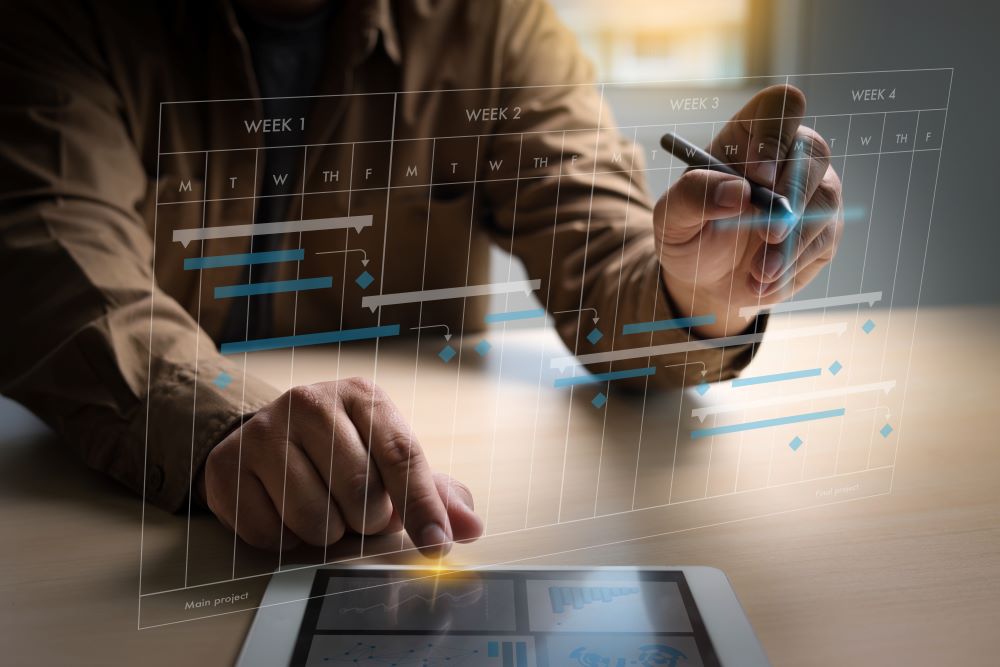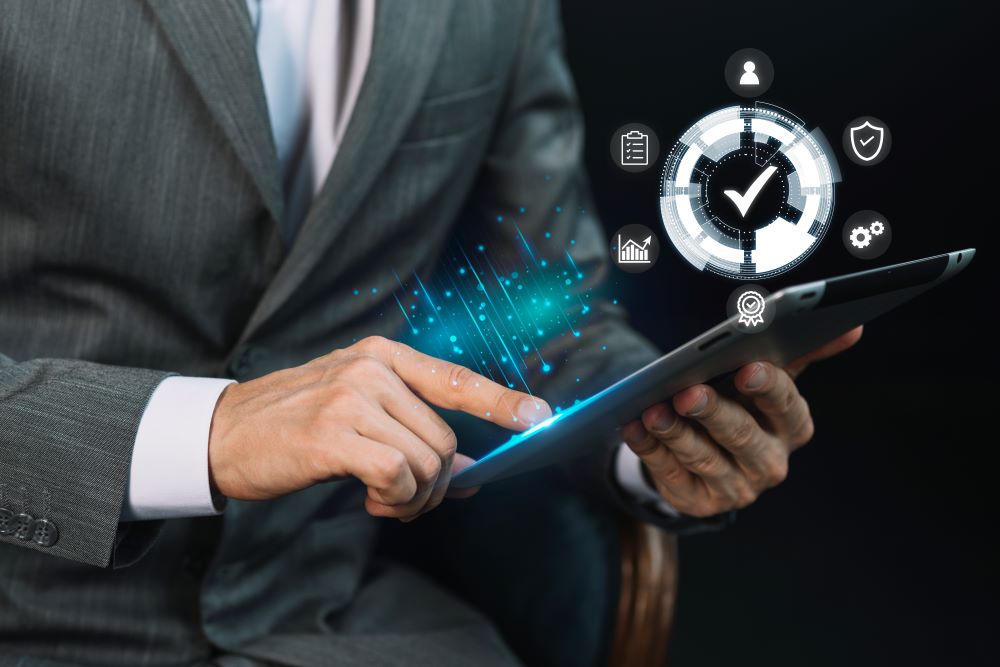Digitalisation: increasing efficiency in project management
The widespread adoption of digital technologies and tools in recent years has brought significant changes in many areas of business, including project management. Digital platforms allow project management processes to be managed more efficiently, information to flow faster and teams to work more closely together, all of which are essential for project success. In this article, we look at what digitalisation means for project management. How it has evolved, its impact and its benefits.

The concept of digitalisation in project management
Digitalisation in project management means the use of digital technologies and tools to make processes more efficient and significantly increase productivity.
The increasing use of digitalisation is a huge help for project managers, from planning to project implementation and follow-up. With digital tools, they can react faster to changes, analyse, forecast, manage risks and communicate more effectively with their team, clients and stakeholders.
The evolution of digitalisation: the importance of enterprise digitalisation and project managers
Digital transformation has become a key focus for organisations in recent years, with companies integrating technology into their entire business to drive fundamental change. However, it has been an important recognition that while digital tools can deliver greater productivity, business agility and process efficiencies, they do not in themselves deliver the expected success. Alongside digitalisation, the skills and expertise of leaders and project managers are needed to achieve real results and strategic objectives.

The impact and benefits of digitalisation in project management
With digital tools, project managers can better:
- monitor the progress of the project
- optimise the tasks
- increase efficiency
- reduce the number of errors
Digital tools can make it easier and faster to schedule tasks and deadlines when planning projects. And digital document management systems make project documentation easier and more efficient to manage.
1. Supporting cooperation in projects
New digital tools allow real-time collaboration between all project members, avoiding unnecessary email exchanges or too many Zoom meetings. They foster better relationships, allow more time for creative work and increase team member engagement.
2. More effective communication between team members
The former star of communication, email, is increasingly being replaced by real-time communication tools that facilitate instant communication even with team members working in different cities or countries.
3. Simpler resource allocation and management
Digital platforms also help project managers to manage resources easily and transparently, allocate tasks and monitor project statistics.
4. Data-driven processes
The more digital a company is, the more information and key performance indicators it needs to make informed decisions. When data is in one place and easily accessible and analysed, it is an excellent source of information for project management, analysis and budget forecasting.
5. Responsibility of project teams and team members
Digitalisation also helps to make the responsibilities of each team and team member visible through digital platforms, and to ensure that everyone understands their role. That is, how small individual cogs affect the functioning of the big whole. They are more likely to gain insight into areas for improvement, plan tasks more effectively and contribute more to project success by feeling like an important part of the project team.

Digitalisation is the best option: digital transformation in project management
As we have already seen, project managers are able to manage their projects more effectively thanks to new digital technologies and approaches, which has an impact on organisations at many levels. Let's look at them now!
Agilis projektmenedzsment
From agile project management an approach that is being hugely influenced by digitalisation. The aim is to adapt quickly and work in a customer-centric way, with digital platforms providing an excellent platform. Agile methods cover project planning, implementation and monitoring, and include teamwork, continuous integration and testing.
Cloud-based project management
Cloud technologies enable project managers to store and use data and applications in the cloud, improving project efficiency and the effectiveness of project management processes. Such systems ensure that teams can access information anytime, anywhere and communicate with each other in real time, even from anywhere in the world.
Project management with robotic process automation
Robotic Process Automation (RPA) plays a key role in the automation of repetitive tasks. Thanks to digitalisation, such processes can be performed by RPA robots, improving project efficiency and reducing errors.
Big Data analysis in project management
Analysing the vast amount of data provides an excellent opportunity for project managers to better monitor the status and progress of projects and make forecasts. All this can help to plan projects more efficiently and can play a significant role in saving time and money.
Artificial intelligence in project management
The role of AI (Artificial Intelligence) in projects is growing. It can help project managers make more informed decisions, as AI-based systems can analyse data quickly and make predictions. Let's see some of them!
Predictive analyses
Artificial intelligence can perform analyses based on historical project data and market trends. These analytics can assist project managers in project planning and developing long-term strategies.
Sensors and data analysis
The IoT (Internet of Things) uses sensors, software and other technologies to connect and exchange information with other devices and systems over the internet. Artificial intelligence can therefore help project managers make fast and efficient decisions based on real-time data.
Chatbots and virtual assistants
Chatbots and virtual assistants can help project managers optimise and automate communication processes. Such applications can help delegate tasks, track deadlines and automate notifications and alerts.
Risk analysis
Artificial intelligence makes it easy to identify risks in projects. In addition, systems analyse the data and make recommendations to manage risks and optimise project implementation.
Project planning tools
AI in project planning tools helps project managers to plan and make decisions more effectively. It enables them to improve project efficiency and help achieve better results.
In summary
Overall, the use of digital technologies in project management can bring many benefits, but it is important to understand that they are mainly tools to make processes more efficient. Digitalisation cannot replace the power of good project management practices and effective teamwork.
Digital tools can only be of real use if project management processes are well planned, professionally executed and team members can work well and effectively together.
If, as a project manager, you also consider continuous development, smooth cooperation within your team, effective communication in your work, and would like to improve your competences, then take a look at our current training courses for project managers!

 Designabc
Designabc